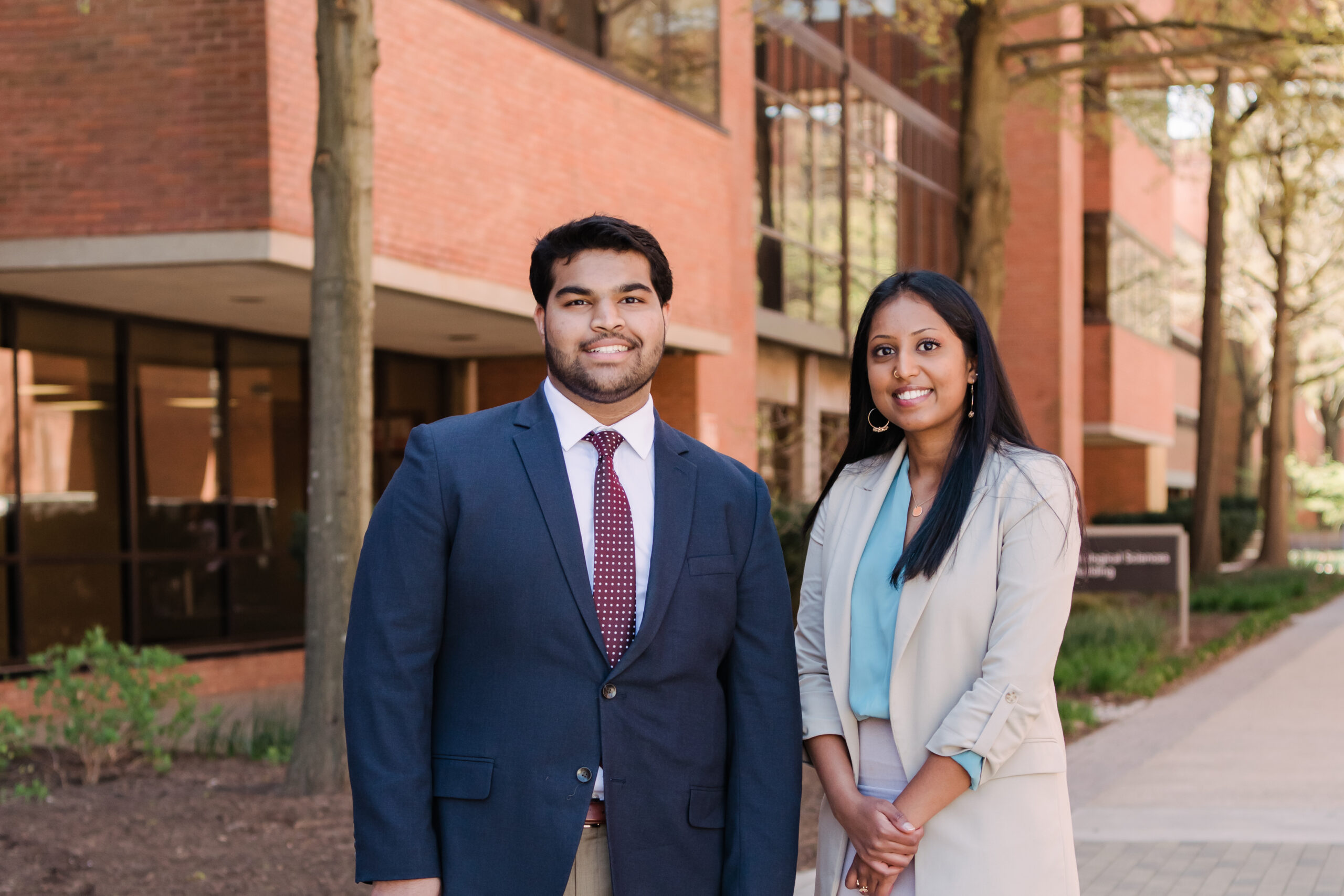Arjun Kanjarpane ’24, M32, biochemistry and molecular biology, and Soujanya “Anya” Viswanathan ’24, M32, biological sciences, are the latest UMBC students to be named Goldwater Scholars. By pursuing their research interests—virology for Kanjarpane and neuroscience for Viswanathan—with rigor and dedication, both have the potential to make a major impact in their fields and in people’s lives.
The Barry Goldwater Scholarship and Excellence in Education Program is designed to provide the United States with “a continuing source of highly qualified scientists, mathematicians, and engineers.” More than 1,200 students applied from over 425 institutions across the country this year, and the program ultimately selected 413 scholars to receive Goldwater Scholarships for 2023 – 2024.
As Scholars, Kanjarpane and Viswanathan will receive substantial funding that advances their undergraduate work and supports their educational paths. They will also gain access to a network of current and former Goldwater Scholars, many of whom are conducting research at the leading edge of their fields.
“We are delighted that UMBC has continued its impressive string of Goldwater awards for this year,” says April Householder ’95, visual arts, director of undergraduate research and prestigious scholarships. “This indicates just how strong STEM education at UMBC is—indeed, it’s among the best in the country.”
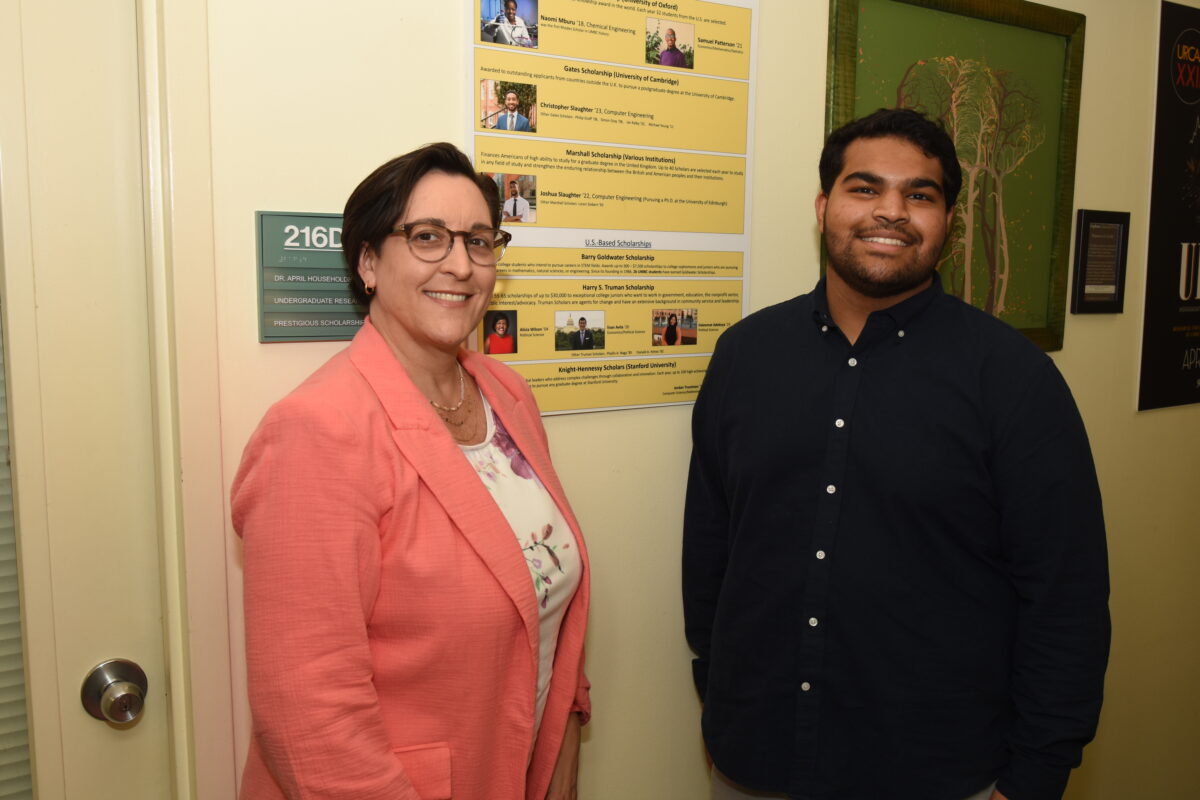
Making the connection
Kanjarpane and Viswanathan are both conducting their own research—Kanjarpane in the laboratory of Michael Summers, Howard Hughes Medical Institute Investigator & Distinguished University Professor of chemistry and biochemistry, and Viswanathan with Rachel Brewster, professor of biological sciences.
One of the projects in Brewster’s lab seeks to tease out how the embryos of zebrafish (small, hardy, freshwater fish) can survive for up to 50 hours without any oxygen at all and then return to normal functioning once oxygen becomes available. “We are looking at the genes and molecular mechanisms involved in allowing zebrafish to survive and recover from such extreme conditions,” Viswanathan says.
Viswanathan started in Brewster’s lab in summer 2021. She immediately saw connections between Brewster’s research on hypoxia (or lack of oxygen) in zebrafish and the same condition in some COVID-19 patients. “It was interesting to me,” she says, “to look at what genes and molecular mechanisms could potentially help humans withstand hypoxia just like zebrafish.”
Her Goldwater research proposal extends the work she’s done over the last two years, but Viswanathan hopes to shift her focus to neurological disorders like Alzheimer’s Disease in an M.D./Ph.D. program after UMBC. She worked on a cutting-edge Alzheimer’s project last summer at MIT with postdoctoral fellow Matheus Victor. A neurobiology Ph.D. combined with a medical education will enable her to investigate the underlying mechanisms of disease, treat patients, and then take any new research questions that arise back to the lab, Viswanathan explains.
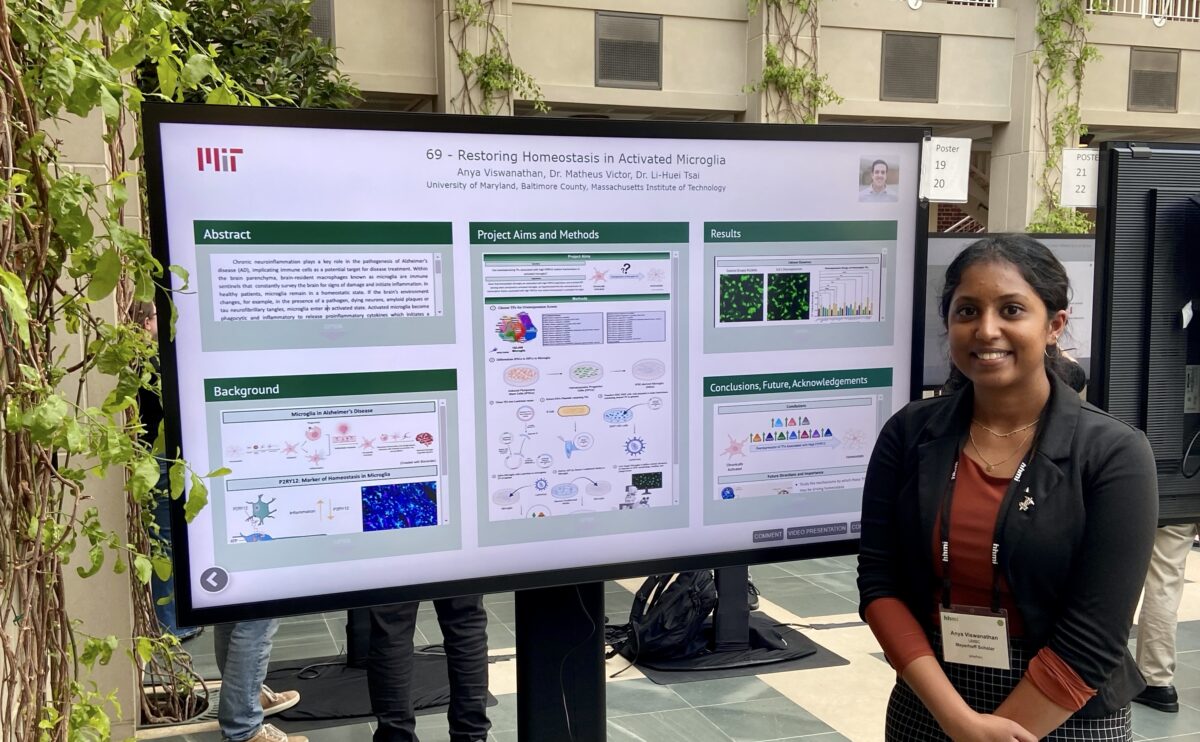
Targeting HIV
Kanjarpane’s research focuses on improving understanding of the molecular mechanisms behind HIV replication. A complex sequence of steps governs exporting the viral genome out of the host cell’s nucleus and then packaging it into new infectious particles. Interactions between proteins and the virus’s genetic material regulate this process, and those interactions aren’t fully understood.
The end goal of Kanjarpane’s work is to build “a more complete understanding of these viral processes,” so that down the line, researchers can “develop drugs or therapeutics that might be able to target one or several of their components,” Kanjarpane says. His Goldwater proposal builds on this work.
This summer, Kanjarpane will conduct virology research under Paul Bieniasz at Rockefeller University. After graduation, he’s planning to pursue a Ph.D. in virology or structural biology. “I would be interested in exploring viruses in a multi-dimensional approach,” he says.
Lifting up others
Beyond their research and academic studies, both Viswanathan and Kanjarpane are committed to supporting their peers and neighbors. “What impresses me most about Arjun and Anya is that they use their talents to help lift up others,” Householder says. “This dedication to others beyond the classroom is what makes them special.”
Both serve as tutors in the Chemistry Tutorial Center at UMBC and enjoy supporting students in introductory chemistry courses. Viswanathan also volunteers weekly at the Y in Catonsville with MS Aquatics, where she works with multiple sclerosis patients on their mobility and flexibility. After each session, the volunteers and participants share a meal.
Viwanathan and Kanjarpane also serve as role models for younger children and help get them excited about STEM. Viswanathan volunteers with the UMB CURE Scholars Program, which exposes students in West Baltimore to research and STEM careers in middle and high school. Opportunities with MS Aquatics and UMB CURE Scholars are both organized through the UMBC Shriver Center.
Kanjarpane founded a non-profit, Scientific Minds of America (SMOA), as a middle school student. The non-profit’s goal is “to reduce social and youth educational inequity through a youth-to-youth system,” he says. During remote instruction at the start of the COVID-19 pandemic, he spearheaded the development of an online tutoring program for Baltimore City youth through SMOA. Over 300 tutors and students have been involved.
He was inspired to form the non-profit after teaching robotics skills to enthusiastic students at a Baltimore elementary school with his FIRST Lego League team. “From that moment we decided we should work to change things, because students should have every opportunity to succeed and achieve their dreams,” regardless of their zip code, Kanjarpane says.
The business skills he’s gained as CEO and now a board member at Scientific Minds also come in handy for his role as treasurer of the Hindu Student Association at UMBC.
Turning points
Kanjarpane and Viswanathan’s desire to reach back to students coming up behind them is driven in part by the network of support that has helped each of them create their own successful paths. Both credit Meyerhoff Selection Weekend as a turning point in their STEM careers.
“Initially, I didn’t even know what a Ph.D. or an M.D./Ph.D. was. I didn’t know that research was a career path that I could take,” Viswanathan says. But at selection weekend, “I realized that my career goals aligned with the M.D./Ph.D. and the Meyerhoff Scholars Program. So that’s why I chose UMBC.”
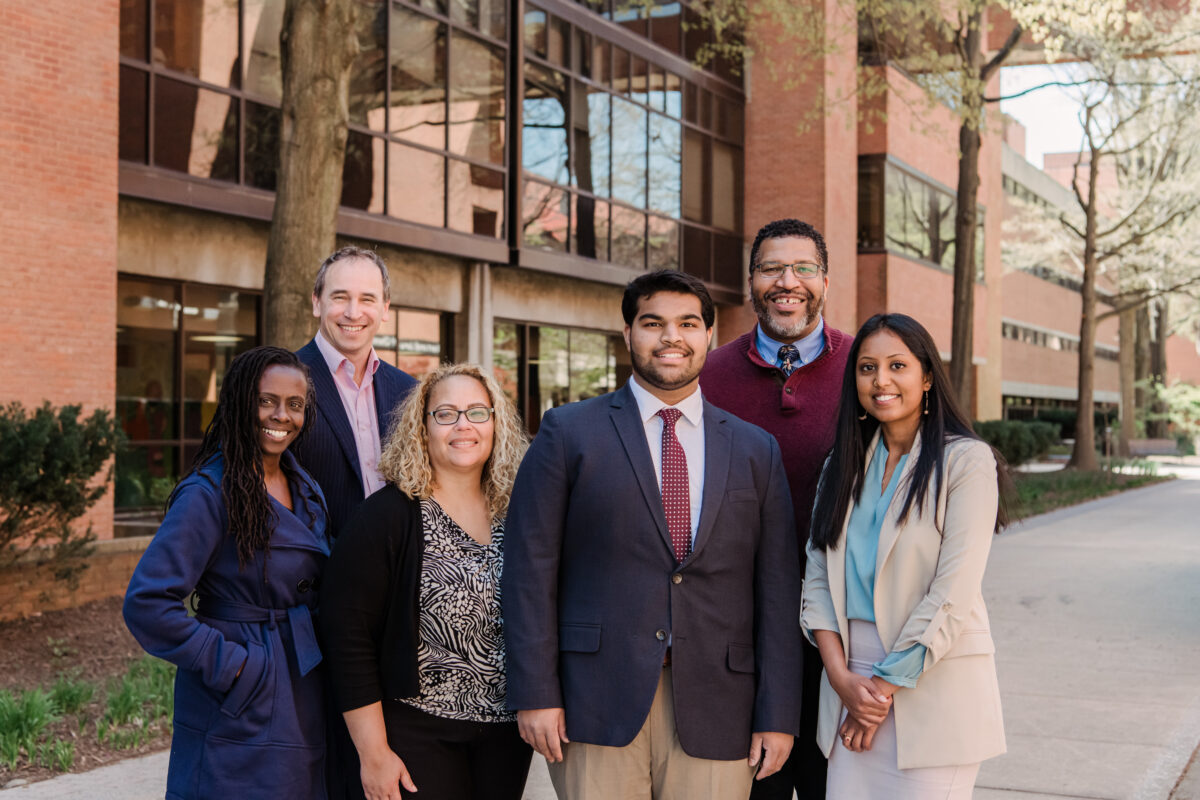
Kanjarpane took his first UMBC class as a high school student and later applied to be a Meyerhoff Scholar. He came out of selection weekend thinking, “‘Wow.’ It’s UMBC all the way,” he says. The Meyerhoff and U-RISE programs “have really helped me to feel supported in college, and that has helped me to achieve my goals and learn with confidence.”
On top of their scholars programs, both students’ research mentors have played a significant role in their growth. “I treasure my lab,” Kanjarpane says, reflecting on how having such a large research team, from high school students to Professor Summers, provides a range of perspectives that pushes the research forward.
For Viswanathan, support from Brewster and Jong Park, Ph.D. ’21, biological sciences, have been key. “Dr. Brewster helped me a lot through the process of applying to Goldwater,” Viswanathan says. “Even with non-research things, she’s always there to talk to me.”
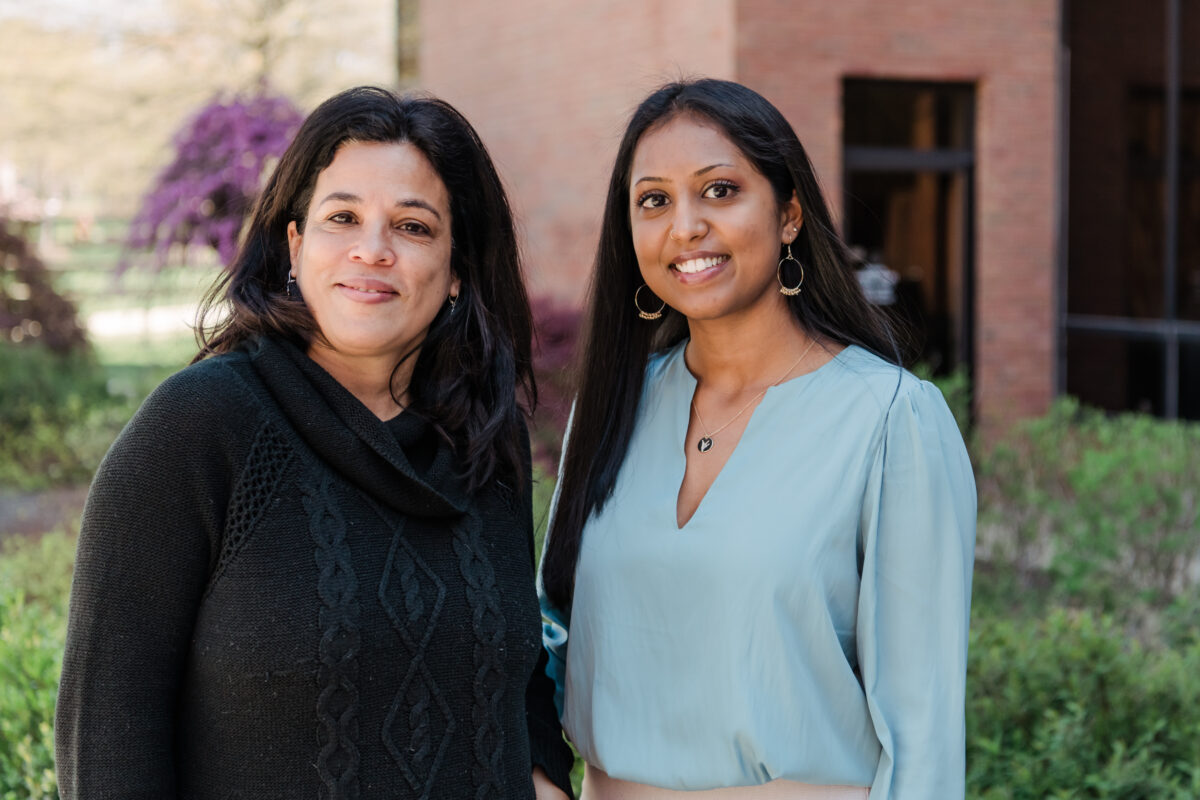
Confidence boost
As freshly minted Goldwater Scholars, Viswanathan and Kanjarpane are excited to connect with others in the program. “What I’ve learned from scientific conferences is that science is all about sharing knowledge and creating new ideas, so I hope to do that with this community as well,” Kanjarpane says.
In addition to the financial support and large network they’ll gain, being named a Goldwater Scholar can also offer scholars a confidence boost. Through this experience, they are welcomed into another community rich in encouragement, talent, and optimism that they can use as a springboard for further success.
“Finding out about this just made me more invested and committed to my goals for my future,” Viswanathan says. “Getting that recognition makes me believe that a research career is a real possibility for me in the future.”
Tags: Biology, ChemBiochem, CNMS, majoraward, rca-1, Research, Undergraduate Research

